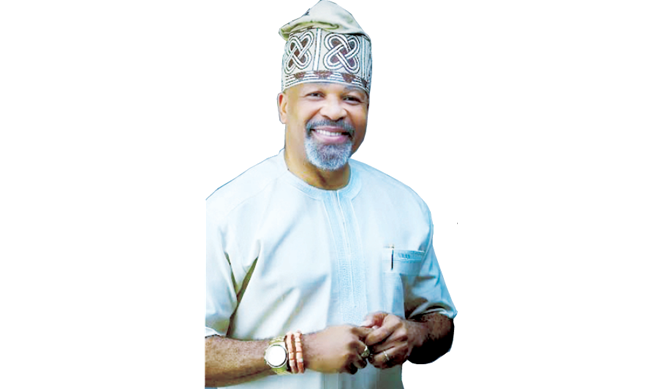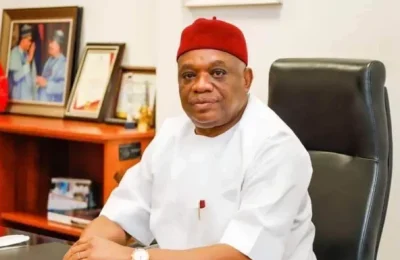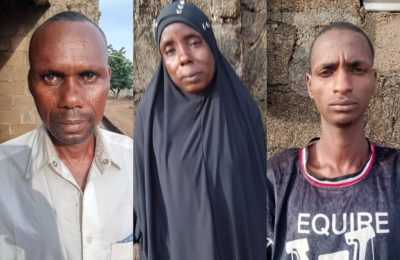Agbaakin Yemi Solade is a respected veteran Nollywood actor with decades of experience in the Nigerian film industry. Recently celebrating his wedding anniversary, the TAMPAN founder spoke about his journey so far, the secret to marital sustainability and why he is usually seen as a difficult person in the entertainment industry. ROTIMI IGE brings excerpts from that interaction.
How has 20 years of marriage, and being an entertainer been for you?
It’s a symbiotic relationship. The chemistry flows for slightly over 20 years that we’ve been together. But the legal consummation, according to the law of the land, took place 20 years ago, on the 21st of September 2004.

I give it to my wife, she manages me very well, she’s been very tolerant, she perseveres a lot. Many find it difficult to manage stardom and marriage.
What do you think is the major thing that has kept you?
My wife, apart from many other things, is just a very normal person, very selfless, very dutiful. She sacrifices more than anybody I know in this world; she’s a Godsend. She understands with me when I have and when I don’t have. She is not ostentatious. She’s not given to material things. Anything I give to her, she prays for me and that goes a long way. The key word in my marriage is sacrifice. My wife started by sacrificing her artistic side. Once we started the marriage, she just stopped going on location. I met her on the set of a TV series, and we became friends. I was married before then but the marriage crashed. When I met her, we became friends, and I looked at the fact that I was getting old and needed to run a family of my own. I toasted her, and she agreed to marry me.

We live together, unless I am not home. She’s always in the house. She does her business and returns home. She’s a family person.
What I would say about colleagues in the creative sector who cannot manage relationships is that I think there are too many distractions; too many temptations that we can’t overcome or surmount. And most of these things are materialistic.
It is the bane of why most creatives can’t run marital business – I call it business. The fact that most of us can’t even sacrifice like my wife is a problem. These days, women don’t want to be domesticated.
They want to be out like the man, do things for themselves, make their own money, and run their lives. But then marriage is not like that. You have to sacrifice, whether you like it or not. This is one thing my wife has done successfully.
People look at us and envy the relationship. She’s a very private person, and she does not even enjoy it when I push her out on social media. She’s not a picture person, she just wants to be home, take care of her family.
You can’t find her here and there. She’s very pretty and she’s a very conservative person.
I always say to my colleagues that they should look beyond material things. Material things are good but that should not define who one is. Marriage is more like friendship because it’s a life contract. Nobody wants to get married and be separated or divorced in a few months, or a year. And that is why you bring the whole world together to celebrate love. That’s why I love the Yoruba prayer when one is getting married that says ‘May God allow you both to stay friends till the end of it all’. I say to people, marry your friend. Some of our colleagues have spouses outside Nigeria where they live. It works for them that way, but the essence of marriage is to live with your spouse. That is marriage. I’m not criticising anybody though.
In Nollywood, you seem to have a very controversial personality…
They think I’m very complex, they think I’m heady, they think I do what you call show off. They think I display or exhibit academic tendencies. I have been hearing that for about 30 years. I don’t know why anybody would think that I am all of these things. I am not. The quality of training I got would not make me unnecessarily quiet or subservient. Permit me to use the Yoruba saying, ‘Because we want to eat meat we should now give respect to the cow’. That is who I am. I will not be subservient unnecessarily to anybody when I know my onions. I was trained very well.
But I work with a lot of persons who are very talented. They may not have gone through the kind of training I got, but I respect them. But you see, when you want to put things right, and they think, ‘oh, Mr. Know it all’. We are on set and you are giving me red wine in a teacup, or you give a character just a first name without a last name. When I point these out, they frown and take offence. Then they begin to look at you like something is wrong with you. And because I don’t produce my own films, they weaponise all of these things, that if we don’t call him, he will suffer.
When I was a drama student in the University of Ife now Obafemi Awolowo University (OAU), Professor Wole Soyinka would tell you that after you write the essay, you must do a critique of what you have written, like an independent third party. Our people don’t like critiques. It’s not criticism. It’s a critique.
You invite me to work, and you are telling me to bring my clothes and things. Do you know what it costs to build one Agbada? And you want me to bring like five. I’m fueling my car, at N1,000 a litre, yet I cannot have a say. Or I get there, and you give me N5,000 to eat per day and you put me in one room that is not conducive, yet you want me to keep quiet.
I’m not the type. I want this work to feed me and feed my family. I’m not working for awards, I work for reward. Let me do the professional work and get paid and I go. I lead a very simple life and that’s why you don’t see me everywhere.
You are someone who has been able to successfully do a lot of Yoruba and English movies. What do you think gives you that edge?
When you listen to me, you will know the quality of my training. I’m a very disciplined artiste, I’m one of the most disciplined that I know.
You can ask these producers or my colleagues. I don’t joke with work because that’s the only thing I have. Even at the point where my wife was in labour, I left her in the hospital and I went on set. How much sacrifice will anybody make beyond that?
On how I get these roles producers watch and say, ‘I like this man’s work, this guy is articulate. He has what I want.’ Okay, these are the characters we have in this story, it can fit in. Regardless of the language, everybody knows I’m Yoruba, and I speak English Language, which is the lingua franca of Nigeria.
Producers who believe in my prowess as an actor, and that I can deliver, invite me. No caps, no nepotistic tendencies. I don’t belong to any clique, because that is one factor that is grinding Nollywood to a halt. He is not in our sector, he’s not in our party or caucus. Until we created Nollywood, I didn’t know where many people came from. But people would say to my face, ah, he’s Yoruba now. I can’t put Yoruba in my movie.
I know a lot of our persons, especially practitioners in the Yoruba genre come from two trees. There are two trees in this business in the Southwest. It’s like River Niger and River Benue; we have the Ogunde tree and Wole Soyinka tree.
So I am at Lokoja, the confluence. I was Wole Soyinka first, then I added Ogunde in 1993 when I decided to feature in movies done in the Yoruba Language.
I have always seen myself as a veritable bridge that can swing both ways, and that was what gave birth to TAMPAN. When I created the Theatre Arts And Motion Pictures Practitioners Association Of Nigeria (TAMPAN) in 2009, I wanted to bring people like me into a fold. But somehow, I lost that TAMPAN to what it is now because I released it.
What do you think is missing in TAMPAN?
The entry point. Then training and training and training. Individuals are helping themselves now. Some are attending courses here and there, but we are talking of the collective.
Nobody is talking about professional bodies any longer. You have your money, you have your story. You hit the location, you shoot your movie, go to cinemas, or go on YouTube.
Years back, you campaigned for a politician and then later you tweeted that artistes should not run after politicians. Are you not contradicting yourself?
No, it is not contradicting. I spent my money on that campaign. It was the governor of Lagos State. I joined the media and publicity committee and I used my money to print caps and vests. I didn’t collect a dime. The chief of staff, Tayo Ayinde and the deputy were aware.
How do you feel knowing that a lot of your colleagues have benefited a lot and you have not benefitted from the Lagos State Government?
Nobody is benefiting anything, I just felt like I escaped death. During the flag-off ceremony, somebody was stabbed. I witnessed it, and I escaped bullets by a whisker. So I said, no, it’s enough.
Does that mean you’re never going to campaign for any politician?
No, campaign will come in, but let the politician reach out to me.
I don’t want to go to them.
Will that not mean you will be paid for it?
No, we’re not talking about payment. You see, we will sit down and discuss. This is what I’ve always said to my colleagues, especially in this last general election. I said, can we just sit, let them come and we will lay our cards on the table. I see that when politicians want to contest; I’ve even been involved in one or two of those, they call actors, and the guilds and say, if I become this, these are my plans. What do you want us to do that will make you support us?
But you see, there’s this tradition that I have seen. It’s a very ugly convention that the politicians expect us to come to them most times. And that is what I have been saying.
If they want to meet the medical health sector, they will do it properly at a venue, and it will be dignifying. But what you see is that my people will probably list names and take to them.
Is that a failure of the guilds?
It’s not about guilds. It’s not even about associations, it’s the practitioners. I’ve always said, don’t use the association to campaign. Most of us have individual names that are known. If I choose to support BAO as governor of Ekiti State, that is me, the individual doing it. Even if I’m president of a professional body, I won’t lead my people in. Let it be an individual thing. Why do I have to lead the professional body?
That is what happened in Ogun State, where I hail from originally. The association, TAMPAN, is more or less in limbo in that state.
And I warned the officers there, don’t do it, but they did it. Now the governor, who they campaigned against, is in power.
What do you think should change in Nollywood that will make it more professional?
Since 2005, we have been tinkering with the idea of having a regulatory body. It has not worked. That’s about 20 years now. Amaka Igwe, one of the proponents, is no more. Second reading was the last thing we had. I’m a director with the Audiovisual Rights Society of Nigeria. Mahmoud Ali Balogun is our chairman. We have made moves, too. We’ve done a lot about copyright, but the average practitioner is not interested in all of these things. That is a big problem. Now, if we can get the government to partner with us, let us have a regulatory body, then we’ll be able to sanitise the system. The entry point will be well-guided and guarded. Not an all-comers affair. Anybody can just crawl into Nollywood. Once you have your storyline, and then the money, nobody is asking questions.
Over the years, there have been a lot of controversial stories about you, How has your wife been able to cope?
There have been different allegations, especially when it involves women. When people say I give roles for sex, I think it’s the dumbest kind of allegation because I’m not a producer. People don’t know out there and I don’t owe anybody an explanation. Once I show my wife, I tell her, ‘Honey, sorry, something is brewing’. She just tells me to be careful. My wife is a very peaceful person, otherwise, we wouldn’t have been together for about 22 years now.
I have a caustic tongue. When people come into my space and I curse them, they begin to think of how to embarrass me. Then they cook up all these things. I recall one where a lady wanted to attend an award event with me and I declined. The conversation went sour. How will you go in with me? Are you my wife? She didn’t like the way I responded. People are like that.
My marriage can’t crumble because of all this rubbish, my wife knows me.







